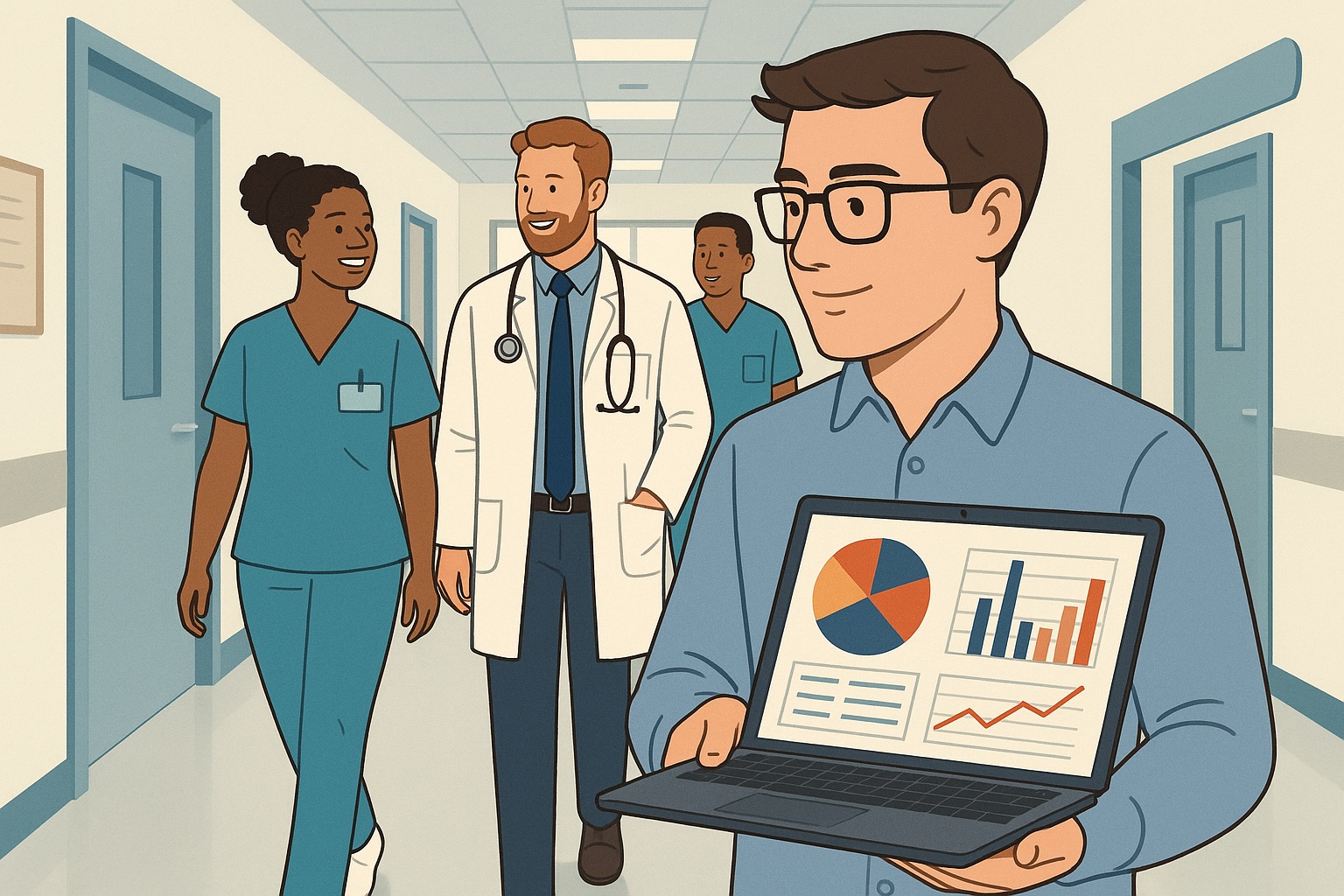What Does a Clinical Data Analyst Do?
A Clinical Data Analyst plays an unmistakable role in the healthcare sector. These professionals are responsible for collecting, analyzing, and interpreting data from clinical trials, medical research, and other health-related studies. The goal of their work is not only to ensure the quality and integrity of the collected data but also to support decision-making within healthcare, such as the development of new medications, treatments, and diagnostic tools.
Collecting and Analyzing Clinical Data
The primary task of a Clinical Data Analyst is to accurately gather data from various sources, such as patient studies, clinical trials, and medical databases. This data can range from basic patient information to complex results from scientific research. They then analyze the data to identify trends, patterns, and anomalies that may contribute to the development of new medical knowledge.
Ensuring Data Integrity
It is essential that the data collected for clinical research is accurate and reliable. Clinical Data Analysts ensure that the data meets the highest standards and that there are no errors or inconsistencies that could affect the research results. They often collaborate with other professionals, such as scientists, doctors, and medical staff, to ensure that the data is correctly interpreted and applied.
Supporting Healthcare Decision-Making
The role of the Clinical Data Analyst goes beyond data processing. Their work supports crucial decisions in healthcare. This can range from providing insights that accelerate the development of new drugs to identifying risks in clinical trials. The information they deliver helps doctors, researchers, and policymakers make informed decisions that benefit patient health.
Technologies and Tools Used
Clinical Data Analysts use advanced technologies and statistical software to process data effectively. Commonly used tools include SPSS, SAS, and R, which they use to perform extensive analyses. They also often work with database management systems and electronic data systems that are specific to the medical field.
Impact on Healthcare
Clinical Data Analysts have a direct impact on the healthcare sector. They help accelerate scientific progress by providing reliable data that improves treatment effectiveness, drug safety, and the quality of care. Their work contributes to the development of treatments that can save lives and make the overall healthcare sector more efficient.

A Day in the Life of a Clinical Data Analyst
07:30 – Morning routine and preparation
The day starts early for a Clinical Data Analyst. After a brief morning routine, the analyst gets to work. They open their computer and begin reviewing the latest data submissions from clinical studies. This is often the moment when the first inconsistencies or ambiguities in the datasets can be noticed—something that is a key part of their daily responsibilities.
08:30 – Reviewing new data submissions
The analyst gains access to the latest clinical data entries, such as study outcomes, test results, and patient information. This is a critical phase where the data is checked for completeness and accuracy. They look for irregularities or errors in the data that could impact the integrity of the research.
10:00 – Meeting with the research team
After a short break, it’s time for a meeting with the research team. During these meetings, the progress of the clinical trial and any challenges are discussed. The Clinical Data Analyst plays a key role in translating the technical aspects of the data into understandable insights for researchers and physicians. The goal is to ensure that all parties are aligned on data collection and analysis.
11:30 – Identifying inconsistencies in the datasets
Back at their desk, the analyst continues to search for inconsistencies in the collected clinical data. These can range from missing information to unrealistic values that could skew the results. It’s essential to detect these issues early to draw reliable conclusions from the research.
13:00 – Lunch break
A well-deserved break. The analyst takes time for lunch and steps away from the computer. This is a great moment to network with colleagues or catch up on the progress of the study.
14:00 – Reporting and documentation
After lunch, it’s time to prepare reports for stakeholders, such as medical researchers, regulatory authorities, and other parties involved in the clinical trial. The reports must be clear and detailed, not only presenting the findings but also offering recommendations based on the data.
15:30 – Optimizing data collection tools
With the final reports completed, the Clinical Data Analyst focuses on improving the tools used for data collection. This may involve testing new software or processes to enhance data quality, enabling future studies to be conducted more efficiently.
17:00 – Meeting on clinical trial designs
The day concludes with a meeting where the analyst contributes to the design of upcoming clinical trials. Here, data collection requirements are discussed, as well as the analytical methods to be used. The Clinical Data Analyst ensures that the data is collected in a way that upholds the research’s integrity and is easy to analyze later on.
18:00 – End of the workday
After a productive day, the Clinical Data Analyst shuts down their workstation and prepares to head home. The day was filled with important tasks, from reviewing datasets to collaborating with researchers. Every aspect contributes to the success of the clinical research and the ultimate improvement of treatment methods for patients.

What tools does a Clinical Data Analyst use?
Clinical Data Analysts play a vital role in healthcare and the pharmaceutical industry by collecting, analyzing, and interpreting clinical data. They work with complex datasets originating from clinical trials and medical research, using a range of advanced tools and technologies to deliver accurate and timely insights. The use of artificial intelligence (AI) and machine learning (ML) is becoming increasingly important in the analysis of clinical data, leading to faster drug approvals and more personalized treatment options for patients.
Advanced Tools for Data Analysis
Clinical Data Analysts utilize various statistical software tools and data analysis methods to process and analyze clinical data. Commonly used software includes SPSS, R, and Python, each offering powerful statistical and analytical capabilities for working with large datasets. These tools help identify patterns, visualize data, and make forecasts that are crucial for the success of clinical studies.
Specialized Software for Clinical Data
In addition to general analysis tools, Clinical Data Analysts also use specialized software for clinical data management. This includes systems such as Electronic Data Capture (EDC) and Clinical Data Management Systems (CDMS), which are essential for collecting, managing, and analyzing clinical data. EDC systems enable analysts to collect real-time data from various locations, which is important for multinational clinical trials. CDMS ensures that data is stored securely and in compliance with regulations such as the General Data Protection Regulation (GDPR).
Identifying Trends and Patterns
Clinical Data Analysts play a key role in identifying trends and patterns in clinical data. By combining data from various sources, such as patient records, lab results, and genetic data, they can derive important insights into the effectiveness of drugs or potential side effects. This not only improves patient care but also supports the safety of medications on the market.
Integration of Wearables and EHR Data
The integration of data from electronic health records (EHR) and wearables opens up new opportunities for real-time patient monitoring. Wearables, such as smartwatches and health monitors, continuously collect vital data, which can be analyzed together with medical data to develop personalized treatments and predictive models. This enables faster response to changes in patients’ health, significantly improving the quality and safety of care.
The work of a Clinical Data Analyst is invaluable to the pharmaceutical industry and healthcare. Through accurate and timely analysis, these professionals contribute to the development of more effective treatments and faster approvals of new drugs. Moreover, their work helps improve patient care and ensure the safety of medications.

What is the salary of a Clinical Data Analyst?
The salary of a Clinical Data Analyst can vary significantly depending on factors such as experience, location, the type of organization (e.g., pharmaceutical companies or research institutions), and the analysis tools and software used. Clinical Data Analysts play a crucial role in processing and analyzing clinical research data. Below is an overview of salary expectations based on different experience levels.
Entry Level (Junior Clinical Data Analyst)
A Junior Clinical Data Analyst, who is just starting in the role and has completed a bachelor's degree in biomedical sciences, pharmaceutical sciences, or a related field, typically earns between €2,500 and €3,300 per month. At this level, they often work under supervision, entering and verifying data, performing basic statistical analyses, and supporting senior analysts on research projects.
Mid-level (Clinical Data Analyst)
A Clinical Data Analyst with a few years of experience (typically between 3 and 6 years) earns on average between €3,300 and €4,200 per month. At this level, they work independently on analyzing and interpreting clinical study data, creating reports, and supporting management in decision-making. Software such as SAS, R, or Python is often used for statistical analysis and data management.
Senior Level (Senior Clinical Data Analyst)
A Senior Clinical Data Analyst with more than 6 years of experience can expect a salary between €4,200 and €5,500 per month. These professionals have in-depth knowledge of clinical research protocols, statistical methods, and the regulations surrounding clinical trials. They are often responsible for leading teams, managing complex research projects, and developing strategies for data processing and analysis.
Lead Clinical Data Analyst / Clinical Data Manager
A Lead Clinical Data Analyst or Clinical Data Manager fulfills a leadership role within the team and often earns between €5,500 and €7,000 per month. These roles are typically found in large pharmaceutical companies or contract research organizations (CROs). In addition to managing data analysis tasks, they coordinate the execution of clinical research programs and ensure compliance with all relevant guidelines and regulations.
Location and Sector
The region in which you work influences the salary. In the Randstad area and at large pharmaceutical companies or research institutions, salaries are generally higher than at smaller organizations or companies in other parts of the Netherlands. Additionally, companies working with innovative technologies or large clinical trials may offer higher salaries to experienced analysts.
Education and Skills
The education and skills of a Clinical Data Analyst also determine the salary. A bachelor's degree in biomedical sciences, pharmaceutical sciences, or another related field is usually required. For senior positions, a master’s degree or specialized certifications in clinical data management or statistics is often requested. Experience with data analysis tools such as SAS, R, Python, or more specialized software like Medidata or Oracle Clinical is essential. In addition, soft skills such as communication skills, attention to detail, and problem-solving abilities are important.
| Job Level | Experience | Monthly Salary (gross) |
|---|---|---|
| Junior Clinical Data Analyst | 0–2 years | €2,500 – €3,300 |
| Clinical Data Analyst (mid-level) | 3–6 years | €3,300 – €4,200 |
| Senior Clinical Data Analyst | 6+ years | €4,200 – €5,500 |
| Lead Clinical Data Analyst / Clinical Data Manager | Specialized / Strategic | €5,500 – €7,000 |

Career path and growth opportunities
As an entry-level Clinical Data Analyst, you have a wide range of opportunities to further develop your career. Many analysts start out by managing smaller, less complex projects, but as you gain experience, you can progress into senior positions where you oversee larger and more complex projects. This not only brings more challenges but also significant growth in responsibility and impact.
Career Opportunities
In addition to advancing to senior roles such as Senior Clinical Data Analyst, Clinical Data Analysts also have the option to expand their skill set and transition into related roles. A common next step is the position of Clinical Data Manager, where you not only supervise data analysis but also manage the entire data process within clinical studies. In this role, you are responsible for coordinating teams and ensuring data quality across multiple projects.
Furthermore, a Clinical Data Analyst may choose to specialize in biostatistics and move into the role of a Biostatistician. In this position, you focus specifically on applying statistical methods and models to analyze clinical data, which is crucial for assessing the effectiveness of treatments and medical interventions.
Growth Opportunities Within the Field
Additional professional growth can be found in specialized roles within the clinical research industry. Examples include positions such as Regulatory Affairs Specialist, where you are responsible for regulatory compliance and approvals of medical products, or Clinical Research Associate, who is involved in the execution of clinical trials and data collection from various medical institutions.
Education and Skills for Advancement
To fully take advantage of these growth opportunities, it is important to continuously sharpen your skills. This can be achieved through advanced training in clinical statistics, data analysis tools, and the latest regulations surrounding clinical trials. In addition, experience with software such as SAS, R, and SQL is often required to take on more complex responsibilities.

Training and Certification
Education and Skills of a Clinical Data Analyst
A Clinical Data Analyst typically holds a bachelor’s degree in a relevant field such as biostatistics, epidemiology, health sciences, or another related domain. This education provides a solid foundation in both statistics and the scientific fundamentals of healthcare, which is essential for effectively working with clinical data. In many cases, a master’s degree in clinical data management or a related discipline is a valuable addition, especially for professionals aiming to specialize in larger research institutions or pharmaceutical companies.
Certifications and Training Opportunities
In addition to an academic background, specific certifications can significantly enhance the career prospects of a Clinical Data Analyst. Certifications in clinical data management, such as those from the Society for Clinical Data Management (SCDM), are often recognized by employers and help develop specialized knowledge that is crucial for managing clinical research data. Such a certificate demonstrates not only in-depth knowledge of data management but also of the regulatory requirements and best practices in the industry.
There are also dedicated training programs that focus on the software tools and statistical techniques commonly used in clinical research. Examples include training for tools such as SAS, R, and other data management software. Mastering these tools enables professionals to accurately collect, manage, and analyze data—an essential part of clinical research and the resulting reports.
Skills and Expertise
Clinical Data Analysts must have thorough knowledge of both the scientific and technical aspects of clinical research. They work with complex datasets and must be able to analyze, interpret, and report on them effectively. Strong skills in statistics and data analysis are required, along with experience in using specialized clinical data management software.
Another important aspect of their role is understanding the regulatory requirements and ethical standards that apply to clinical research. Examples include Good Clinical Practice (GCP) and the requirements set by authorities such as the FDA. The ability to apply these guidelines within the data management process is essential to ensure the quality and integrity of the collected data.
Career Opportunities
Clinical Data Analysts have excellent career opportunities in sectors such as the pharmaceutical, biotechnology, and medical research industries. The demand for professionals who can contribute to the development of new treatments, drugs, and medical technologies has increased in recent years. This role offers many opportunities for advancement to senior data management positions or more specialized roles in project management or regulatory affairs.
By continuously developing their skills and obtaining relevant certifications, Clinical Data Analysts can accelerate their careers and position themselves for leadership roles in larger and more complex clinical studies.

Networking and Industry Associations
Affiliation with Professional Organizations
Membership in professional organizations, such as the Society for Clinical Data Management (SCDM), offers tremendous benefits for professionals in clinical data analysis and data management. These networks allow you to deepen your professional knowledge, develop your skills, and gain access to the latest trends and technologies in your field. Active membership not only advances your career but also strengthens your position within the industry.
Networking and Collaboration
One of the greatest advantages of joining a professional organization is the opportunity to network with other experts and companies in the sector. Strengthening your network is essential for discovering new career opportunities and collaborations. Events, conferences, and workshops organized by these organizations provide excellent opportunities to make new connections. In addition, these platforms offer access to job fairs, internships, and networking opportunities with reputable companies and institutions.
Training and Skills Development
Professional organizations often offer exclusive access to high-quality training programs, courses, and certifications that are essential for improving your skills. These educational opportunities not only help you stay up to date but also increase your career prospects. For SCDM members, there are various workshops and online courses focusing on the latest trends in clinical data management, ensuring professionals are always equipped with the most current knowledge.
Professional Development and Career Opportunities
Members of professional organizations can rely on valuable career support, such as access to job databases and expert career advice. Many organizations also offer mentorship programs, where members are paired with experienced professionals who guide them in their careers. This not only provides an opportunity to receive advice on how to further develop yourself but also to take concrete steps to accelerate your career and grow into the next phase of your profession.
The Impact of Professional Memberships
Membership in organizations like the Society for Clinical Data Management offers not only individual benefits but also contributes to the improvement of the entire sector. By following best practices, adhering to ethical standards, and continuously enhancing skills, members contribute to greater integrity and efficiency within clinical data analysis. These professional membership programs help foster the professional growth of individuals while also improving the overall quality of the field.

Impact and Social Relevance
Clinical Data Analysts play a key role in the future of healthcare. They ensure that medical data is reliable, accurate, and well-analyzed, which is essential for developing safe and effective treatments and therapies. Their work not only contributes to advancements in medical research but also has a direct impact on the quality of care patients receive.
Reliable Data for Better Treatments
In the rapidly evolving world of medicine, reliable data is crucial for making informed decisions. Clinical Data Analysts ensure that the data collected during clinical trials is complete and accurate. This enables doctors and researchers to improve treatment methods and develop new drugs and therapies.
The Importance of Quality and Integrity
The integrity of clinical data is vital to the success of medical research. Clinical Data Analysts ensure that all data complies with strict standards and ethical guidelines, which not only enhances the effectiveness of treatments but also helps maintain patient safety.
Societal Relevance
The contribution of Clinical Data Analysts has a significant societal impact. Thanks to their work, medical breakthroughs can be achieved more quickly, leading to improvements in global public health. By providing reliable data, they help doctors tailor treatments to the specific needs of patients, greatly improving the quality of care. This work not only supports medicine but also contributes to fostering a healthier society.

How to Become a Clinical Data Analyst?
The career path to becoming a Clinical Data Analyst often begins with a solid academic background in a relevant field, such as biomedical sciences, medicine, pharmacy, or a related discipline. This foundational education provides the essential theoretical knowledge needed to work with clinical data.
Steps to Becoming a Clinical Data Analyst
After completing academic studies, it is common to pursue internships or junior positions in clinical research. This practical experience is crucial, as it offers the opportunity to develop skills in data collection, management, and analysis within a clinical context. During this time, you learn how clinical data is gathered, analyzed, and used to support decision-making in medical research and patient care.
Skills and Certifications
Continuously updating your skills is essential to stay ahead in this dynamic field. Clinical Data Analysts must not only be familiar with clinical research methodologies but also with statistical analysis tools and software such as SAS, R, and Python. Earning relevant certifications, such as Certified Clinical Data Manager (CCDM) or other accredited programs, can significantly enhance job prospects.
Networking and Career Opportunities
Building a professional network within the healthcare sector is also important for securing opportunities in this field. Attending industry events, joining professional associations, and maintaining relationships with mentors can contribute to a successful career as a Clinical Data Analyst. Additionally, Clinical Data Analysts can further advance their careers by specializing in subdomains such as pharmacovigilance, medical statistics, or epidemiology.

Case Study: The Role of Clinical Data Analyst
Background
MedHeal, a leading pharmaceutical company, faced the challenge of analyzing clinical research data with the highest precision and efficiency. The development of new medications depended on reliable data, but as the volume and complexity of the data increased, it became increasingly difficult to manage it in an organized and regulatory-compliant manner.
The Challenge
During clinical trials, massive amounts of data were generated, spread across different systems and formats. Managing, analyzing, and reporting this data in a streamlined and compliant way was a major challenge. In addition, strict regulations and guidelines such as Good Clinical Practice (GCP) had to be taken into account, which further increased the complexity.
Action by the Clinical Data Analyst
Lars, the Clinical Data Analyst, was appointed to take on this complex task. He coordinated the data flows from various clinical trials and implemented robust solutions for data integration and analysis. By working closely with clinical teams and IT specialists, he developed a streamlined, structured data environment that fully complied with regulations and the strict guidelines of the pharmaceutical industry.
Result
The data solutions implemented by Lars resulted in more efficient and accurate data analysis. This enabled MedHeal to obtain more reliable results from clinical trials, contributing to accelerated drug development. Additionally, compliance with industry standards and regulations was significantly improved. Thanks to Lars' work as a Clinical Data Analyst, the integrity and quality of the critical clinical research data were ensured, further strengthening MedHeal’s success.

Looking for a Clinical Data Analyst?
For a small fee, you can easily post your job vacancies on our platform and reach our large, relevant network of data and analytics specialists. Applicants respond directly to you, without any third-party involvement.
On DataJobs.nl, we connect supply and demand in the data and analytics job market directly—without intermediaries. You won’t find vacancies from recruitment agencies here. Visitors can view all job postings for free and without an account, and apply directly.
Check out the options for posting vacancies here. Questions? Get in touch with us!

Op zoek naar een uitdaging in data & analytics?
Bekijk hier alle actuele kansen! See vacancies- What Does a Clinical Data Analyst Do?
- A Day in the Life of a Clinical Data Analyst
- What tools does a Clinical Data Analyst use?
- What is the salary of a Clinical Data Analyst?
- Career path and growth opportunities
- Training and Certification
- Networking and Industry Associations
- Impact and Social Relevance
- How to Become a Clinical Data Analyst?
- Case Study: The Role of Clinical Data Analyst
- Vacancies for Clinical Data Analysts
- Looking for a Clinical Data Analyst?



